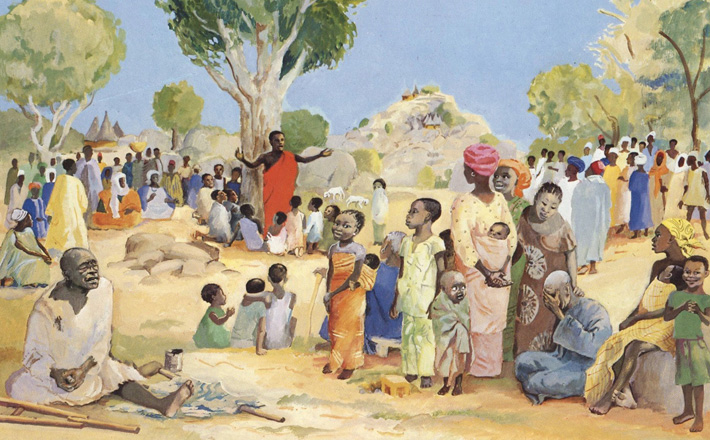Commentary on Matthew 5:1-20
By the time the author of Matthew recounts the Beatitudes, half of a century had passed since Jesus changed the world in his early thirties.
Source material for the Gospel of Matthew seems to suggest a date of composition between 80 and 90 CE. So, how do preachers preach the Beatitudes now that they sit millennia away?
Preachers could start with more looking back and around and examine parallels found in Mark 3:1-13a, 9:49-50, and Luke 6:17-23, 14:34-35, 8:16, and 16:16-17 that complement the occasion and the assurance of the verses from Matthew. Those touchpoints reiterate the importance of the Beatitudes. Yet they do not show how the Beatitudes maintain their believability as they endure across time. With little assistance from the other synoptics, preachers must carefully consider how to telescope from the verses of Matthew to our time with faithful language and insights.
The first verse of Matthew 5 places Jesus at altitude and in a seated posture of teaching. Jesus is like a new Moses, granting new instructions from God:
Blessed are the poor in spirit, for theirs is the kingdom of heaven. Blessed are those who mourn, for they will be comforted. Blessed are the meek, for they will inherit the earth. Blessed are those who hunger and thirst for righteousness, for they will be filled. Blessed are the merciful, for they will receive mercy” (5:3-7).
These lessons and others that follow in subsequent verses begin with the Greek word makarios. The NRSV renders makarios as “blessed.” Yet perhaps a more down-to-earth and better translation of makarios would be “happy.” One might even go with “happier.” “Happy are the poor in spirit, for theirs is the kingdom of heaven. Happy are those who mourn, for they will be comforted. Happy are the meek, for they will inherit the earth. Happy are those who hunger and thirst for righteousness, for they will be filled. Happy are the merciful, for they will receive mercy,” and so forth.
Even a seasoned preacher might shrug off the gravity of that first word by putting more homiletic emphasis upon the promises “for they” and “for theirs.” But the imperative of happiness warrants a closer look, especially if the words attributed to Jesus deliver wisdom about the reality of the world given to us.
Is it really possible to be happy when our faith has been pilfered or plummeted? Introductory courses in the Old and New Testaments shake the piety of students. Everyday folks might experience a similar despair after engaging the skepticism of fiction or episodes exposing what Christmas or Easter really mean. Or worse, evils such as sarcoma, sexual assault, prejudice, slaughter, or natural disaster can ravage the spirit to nothing.
In the wake of such trauma, whether experiencing it from a place of privilege or being truly oppressed, how can Jesus absolutely declare the suffering as happy? The same kind of head-scratching interrogation could just as easily be applied to his promises regarding the meek, those who hunger and thirst for righteousness, the merciful, and so on. When was the last time that we as preachers witnessed happiness in those addressed by the Beatitudes?
Jesus seems to rely upon eschatological knowledge or hope in the future of God to claim happiness for his hearers and God does promise relief and redemption in the end (Revelation 21:4). Yet Jesus was not naive. He knew the perennial nature of human suffering, even when God shows up in the flesh. He confirms it in verse 12.
According to Matthew, Herod killed all children two and under at the time of Jesus’ birth (2:16). Long before that, historian Ben Kiernan notes that Mesolithic hunters from more than 5,000 years ago carefully arranged 34 skulls of men, women, and children bearing wounds from stone axes in a cave in what is now Germany (Blood and Soil, 1). So, as bad as things seem now, the fact of the matter is that cruelty has infected life as long as we can remember.
Given that the world was not kinder before, during, or after the life of Jesus of Nazareth, I also want to suggest that perhaps Jesus proclaims felicity in the Beatitudes not merely as a disposition for the afflicted to experience as some sort of mysterious interior exercise or charism (divine gift). But he also trusts his followers who are not in dire straits to play a part in manifesting the joy of God in service to others, especially when reality seems nowhere near the salvation that the Messiah brings.
He calls his hearers to be the salt of the earth and warns us not to lose our savor. Otherwise, our lives spoil and become good for nothing (Matthew 5:13). He calls us to be the light of the world. He warns us not to hide the radiance of God, but to allow it to shine before others so that they may see your good works and give glory to your Father in heaven” (verse 16).” As peculiar as the promises of happiness seem in the Beatitudes, they seem to rest in part upon the ability of the followers of Jesus to attend to the wounds of the world with the saltiness of God, to illuminate a way forward in impossible circumstances with divine light, and to do those things as if it’s just us being who we are. Like it’s second nature.
Jesus’ hyperbolic speech about the law in verses 17-20 stresses that there’s work to do in the name of God: “For I tell you, unless your righteousness exceeds that of the scribes and Pharisees, you will never enter the kingdom of heaven” (verse 20). Preaching how the promises of the Beatitudes persist over time then entails naming the mysteriousness of what they guarantee, which is too wonderful for us to know with any precision, and also naming specific ways in which we can participate in making others happy as promised by God.
PRAYER OF THE DAY
Loving God, your son Jesus taught many things that helped people know how deeply you love humanity. Help us to live in your love, so that we might be beacons of light for others. We pray these things in the name of Jesus Christ, our Savior and Lord. Amen.
HYMNS
This little light of mine ELW 670/trad.
Here in this place (Gather us in) ELW 532, GG 401
Longing for light, we wait in darkness (Christ, be our light) GG314, ELW715
CHORAL
Blessed are you, William Beckstrand


January 27, 2019